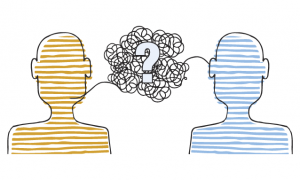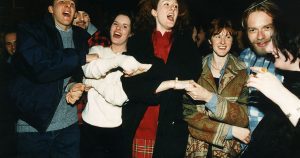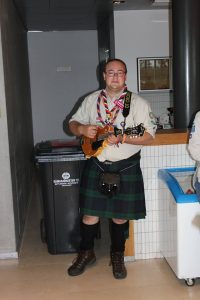Hi everyone, Martin here again. This one is based on a conversation I had over the weekend. In short, we were talking about a Universal language. How do we communicate with people who don’t speak our language?
We Brits are very good at talking loudly and pointing – I got through a week long high school trip to Germany using pretty much only the words “Ja”, “Nein”, and “Der/die/das” whilst nodding, shaking my head and pointing respectively. Wasn’t enough for a conversation, but I got the point across.
Languages have never been my strong point. I struggle with English (or indeed Scots) most days, so French, German and Spanish were beyond me at school. Since leaving school I’ve got to a point where I can just about get the jist of some written languages, but my face goes blank when someone speaks at me in another language!
It is then perhaps fortunate that the Jamboree will be happening somewhere where everyone speaks English (American, simplified). That being said, think about some of the Americanisms we know about – crisps vs. chips, chips vs. fries, etc.
The official languages of WOSM are English and French – so anyone attending should be able to speak one (or both) of these languages. Don’t expect everyone you meet to be conversationally fluent in English, and if you, like me, have a strong accent, expect confusion…
Language barriers will exist, but should be relatively easily overcome. I’ve not really encountered any major issues at Jamborees, it seems to affect the likes of the Moots, where you’re organised into an international patrol and could potentially be the only person speaking your language in the group your camping and working with, where this one causes issues.

But this wasn’t really what we were talking about. The best way I can describe this is through an anecdote.
Way back in the mists of time I went to the Bla Sommer Danish National Jamboree in 2009. It was my first event as a Leader and it was absolutely fantastic. it was two weeks of very back-to-basic type camping. On the last night, after the closing ceremony we were due to get on the bus to go back to Scotland at some ridiculous time in the morning. We’d dropped our tents during the day and packed them onto a lorry so decided, as the young and stupid often do, that we’d wait up till it was time to depart.
Our Danish hosts did the same and as it approached midnight they took us out into the field that had been our home and made us stand in a circle. Other groups, and their hosts, came out and the circle got bigger and bigger. The Danes started singing.
I don’t speak a word of Danish, but there was something about the song that I recognised. It dawned on me that it was Auld Lang Syne. For those not in the know, it’s a poem written by the Scots poet Rabbie Burns, nowadays traditionally sung to welcome in the new year and at the end of weddings and such. Wikipedia tells me that it’s used to close international Scout jamborees, which is probably why it was being sang. But to me, it’s introduced by Jackie Bird shortly after Mons Meg is fired from the battlements of Edinburgh Castle every year at Hogmany.
So, recognising this auld Scots song, we dutifully joined in, adding our voices to the Danes. Over to my left was a troop of German scouts who had the same moment as I did and joined in, singing this song in their language. By the time it came to cross hands, there must have been about a dozen different languages singing the same song.
It was a magical moment. A dozen different languages, and we each knew what the other was saying.

Song, and Music in general has this ability to cross language barriers and speak directly.
Again, to use an anecdote, I like my Scots Traditional Music. Some of it is sang in Gaelic and I don’t speak a word of Gaelic. I can’t read it and I can’t understand anyone speaking it! But I was at a friends house a few years ago, playing music with friends and a girl picked up her ukulele and began to sing in Gaelic. The room was totally transfixed by her voice and the words she was singing. I don’t think any of us understood the words, but the raw emotion behind them was clear to us and I don’t think there was a dry eye amongst us. Afterwards she explained it was a lament from the times of the Highland Clearances, the words and music kept alive in secret after the language was banned in 1746.
I’m somewhat known as “that guy who plays Wagon Wheel”. An identifier I picked up in Japan and have continued since. There is a video floating around of me and a friend playing it in Iceland. It’s a song I first heard in 2013 and was one of the motivations I had for learning to play the menagerie of instruments that I do. I have taken it everywhere I’ve been and shared the song with as many people as I can because I love it.
It’s a song that resonates with me because it’s about a journey, and as I say, the Jamboree is a journey. It’s sang in the first person, from the point of view of a man travelling home to be with his love and the help and hindrance he encounters on the way.
Again, it’s oddly surprising how well known it is, and anytime I’ve played it, I’ve had people sing along.

Music and song, from things like “Wagon Wheel” through to silly campfire songs like “Alice the Camel” or “10 Green Bottles” are very much icebreakers. If your region, town or city of the UK is renowned for a particular band or artist, you can use their music on culture day. Bands like The Beatles (Liverpool) or Oasis (Manchester) or the Proclaimers (Edinburgh, but Scotland in general) are known the world over. Other bands like perhaps The Levellers (Brighton), Show of Hands (Devon) or Fisherman’s Friends (Port Isaac) might not be as well known, but why not try exporting their music across the world. (Incidentally, if they’re new to you, go check them out…)
If you play an instrument, take it with you, you will not regret it. It might be slightly more complicated with the flights etc. but you won’t regret it. I’m planning on taking one of mine.
So I’ll leave you with this, you find people congregate around those playing music and it helps start conversation. I played almost a nightly gig in Japan with folk coming from across the site to sit with their friends and enjoy the music. One afternoon I had my mandolin with me in the queue for the IST canteen and started playing. The next day there was signs up asking for buskers to play a Queue-jam. I was sat one afternoon in the shade playing Billy Bragg songs in Japan when the BSA’s Morale Police accosted me and gave me a badge and neckie for services to Morale. I do have photos, but I don’t know where they are, once I find them I’ll stick them on here because it was a funny experience.
Anyway, here’s “Wagon Wheel”…

